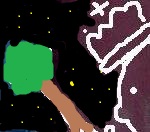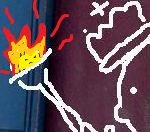Full Disclosure: I first heard of Suleyman through the Influx Press editor Kit Caless, who asked if I’d be interested in a review copy. I said no because I was busy with uni work at the time, but followed Suleyman on Twitter, which convinced me to go get the book anyway.
Review: I’d recommend reading (and a content warning here for an account of deeply unsettling acts of violence) Suleyman’s essay in The Quietus about the torture and murder of her grandfather during the civil war in Cyprus in the early 60s. It is a remarkable piece of journalism: calm and clear-sighted and patient with a reader who knows little about the conflict. Second, I’d watch the video linked above. Suleyman is a confident and engaging reader, and her lack of ceremony or artsy preciousness is deeply refreshing. The poems she selected to read there are powerful, pointed and articulate. And there’s a lot of these qualities to admire in Outside Looking On.
In the video, Suleyman rejects the book’s framing device, the everlasting light of Canary Wharf. It sits strikingly on the book’s cover and features movingly in its introduction, signifying Britain’s failure to provide quality of life for its migrant citizens, particularly the poet’s father, a labourer ‘who cannot pass a building site without offering acute improvements on the development of it’, but features only peripherally in the poems. Outside Looking On is an intimate collection, full of complicated and unadorned examinations of the poet’s relationships (in her words, ‘I got dumped and drank some wine and wrote a collection of poems’, which is great, so did Rimbaud in all likelihood), and the tower seems a bit of a red herring. Anyway, what the book does is more interesting than what it doesn’t do, so here goes.
Concision is crucial to Suleyman’s poetry, and it feels appropiate that the physical book is significantly smaller than the common/garden poetry collection. Outside Looking On contains 37 poems which rarely meet the bottom margin, and several pieces make explicit use of white space to convey their meaning, like ‘Postcard’ (a blank page with a short line at the very bottom, ‘Can you see it? I left it here for you’), ‘Instead of Working’ (a poem about trying to bring order to a bookshelf as a substitute for or model of bringing order to life, expressed by a bulky, margin-justified box of text) and ‘George’:
‘I pour whiskey down my
my throat like I
am filling
a vase. And put
cigarettes like stems inside.’
It actually took me typing it out to notice the two ‘my’s in the poem. These pieces use their allotted space wisely, and sit comfortably alongside several other short poems that aim in their brevity to give just information to be understood and no more. In its own way this is a rare kind of risk-taking, the risk of understatement, and when it works (see ‘Coffee Table’, nine lines about an artefact that embodies the poet’s nostalgia with ‘A friend’s number carved into it. / Small holes, burns from rollies’; or ‘Tartan’, another poem in which memory is physically inscribed) it packs a punch.
The flip side is one or two poems remain (to me anyway, though I may be missing something obvious) just beyond parsing. Suleyman explains in the above video the story behind ‘The Altercation’: the poet needed her passport renewed to attend a funeral, the clerk says there is the official note advising against it. Suleyman suspects, believably, that this note had been added in an act of racial profiling, and in solidarity the clerk renews it anyway. It’s a great story, a small victory against racist bureaucracy, but without this information the poem is a little confusing. Similarly, I suspect there is a bigger story behind ‘When She Calls’, its central turn, ‘You are // a good liar, I think.’ But the broader significance is frustratingly out of reach. Though again, I may just be missing something.
On the other other hand, this drive for brevity allows the few poems that do stretch their legs, sometimes into flat-out prose, a kind of joyful ranginess, room to express themselves in greater depth. Some of the book’s most memorable pieces fall into this category, for instance ‘Smollensky’s’, in which a friend’s boss, ‘in his best / phone-answering voice’ says to the poet, on spotting her tattoos ‘Islam, sell it to me‘. The following poem, ‘Inland’, is a tiny piece dedicated to the novelist Nikesh Shukla, three lines about ‘black lentils’, a taste of home (and all the complications that idea entails) that animates Shukla’s most recent book, The Time Machine. Suleyman picks up the idea and runs with it to formulate a complicated and generous response in ‘Dear Boss from ‘Smollensky’s”. This poem cannot be done justice by quoting in part, not least because it is explicitly about the importance of private context, in this case the strength the poet draws from her grandmother and the ‘familiar smell of heat, and sweat, and molohiya, which itself smells of heat and sweat’. If the close of ‘Smollensky’s’ seemed to leave a narrative hanging, it is absolutely to the poet’s credit that the implicit answer to a narrow conception of the world is the time and space to broaden it. That the poem gets no (outwardly) angrier than ‘my grandmother […] would rather stand still than be made to walk behind any man’ is astonishing.
It’s this generosity that survives multiple readings of Outside Looking On. Though I found several poems difficult to grasp on a first run, this may be a result of a) the poet’s unwillingness to slow down or compromise her depiction of a world little seen in the prizewinning books of contemporary poetry and b) my own unfamiliarity with such a world. More power to Suleyman’s elbow. ‘Brian’, a hospital porter who, if given the reigns of political power, would
‘middle the wages, like communism,
somewhere central and everyone gets a taste.
Then he’d raise the wages of porters so he could
quit politics and work that again. He shouldn’t
complain. Some people don’t have jobs.’
He appears three more times in the collection, someone who has suffered but refuses to make others suffer, yet remains a believable, unliterary presence. He is not the fisherman in Connemara, and enjoys a parity of narrative esteem with the poet herself, which is rather extraordinary.
Tl;dr: Outside Looking On is a strong, thoughtful, challenging first collection, and I’ll be keeping tabs on Suleyman’s work in future. She’s on Twitter and you can get a copy of the book for a mere six bucks forty from Hive.



One thought on “Chimène Suleyman – Outside Looking On”